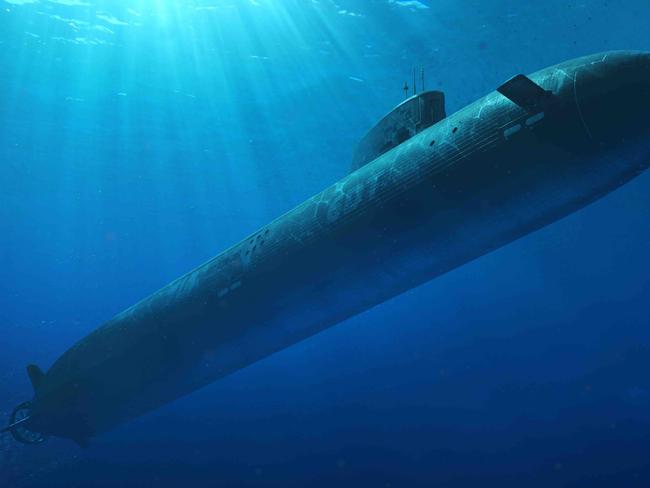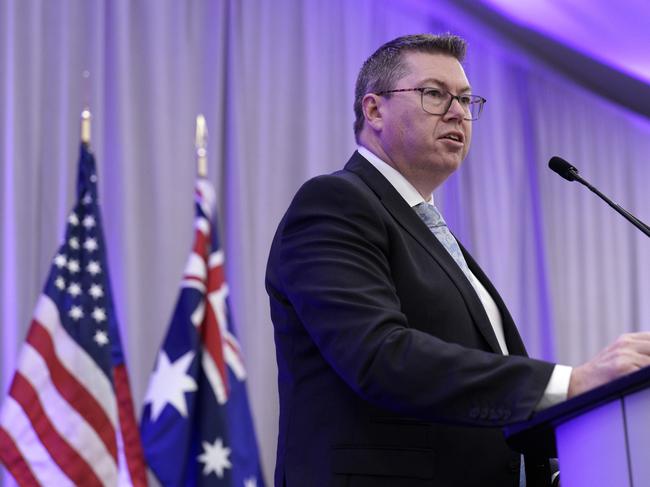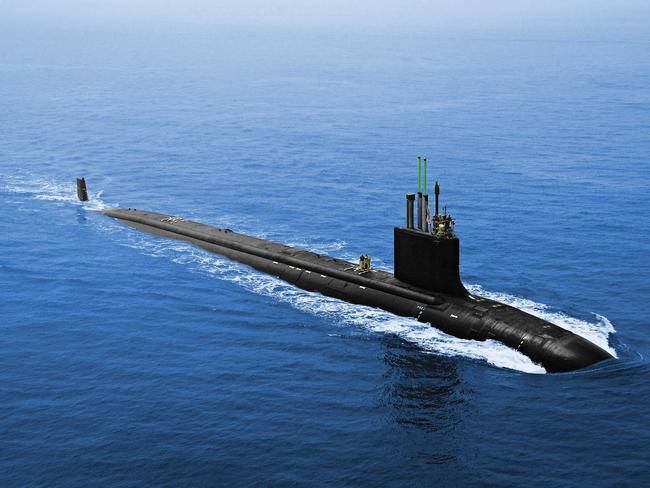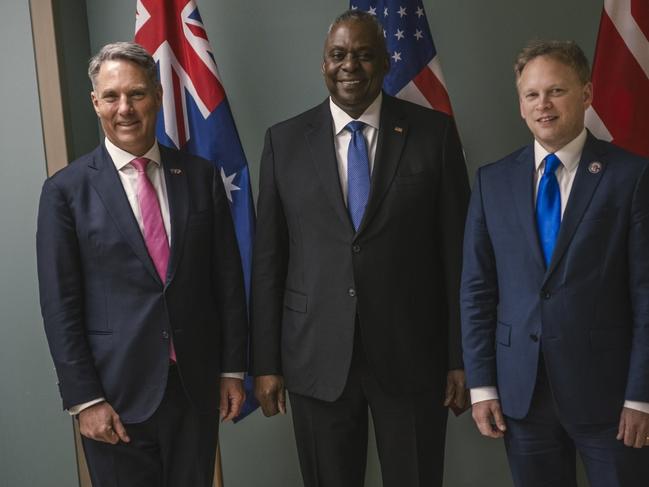US Congress passes new laws to sell nuclear submarines to Australia
The US Congress has agreed to sell its nuclear submarines to another country for the first time, giving the green light to the AUKUS pact with historic new laws.
World
Don't miss out on the headlines from World. Followed categories will be added to My News.
The US Congress has approved the sale of nuclear submarines to Australia, ending months of tricky negotiations over the unprecedented transfer that had cast doubt on the AUKUS pact.
And while the historic law still offers a get-out clause for a future US president to scupper the deal, Australian and American leaders maintain any scepticism in Washington DC has been all but extinguished with a convincing bipartisan consensus.
The US House of Representatives voted on Thursday (local time) to allow the transfer of three Virginia-class submarines to Australia in the 2030s, matching the Senate’s support to send the legislation to President Joe Biden’s desk for his signature.
The law is part of a sweeping defence policy bill which also includes what Australian Defence Industry Minister Pat Conroy said was a “revolutionary” overhaul of US export controls, ending the lengthy delays Australia has faced to purchase defence technology.

“This is a momentous day for our alliance with the United States and the delivery of the AUKUS pact,” he said.
It was revealed last week that US politicians had given the green light to the submarine transfer, after Republican rebels had threatened to block the agreement because they feared the slow pace of submarine production would compromise the US Navy’s needs.
Mr Biden offered a $US3.4bn ($A5bn) boost to the US submarine industrial base to sway the holdouts, and Mr Conroy said there was “strong congressional support” for that money to be delivered soon.
As part of the agreement, Australia will also spend $3bn to bolster America’s shipyards. Mr Conroy said the timing of that payment was now being negotiated.
He said the “broad order of magnitude” for the price-tag of the submarines had also been agreed, but that it would remain under wraps and be finalised in the 2030s, depending on factors including the maintenance required to Australia’s first nuclear boats.
The legislation requires that the US president at the time of the transfer affirms that it does not degrade America’s “undersea capabilities” or conflict with US foreign policy.
US congressman Joe Courtney, a co-chair of the AUKUS working group, said that was “not anything I’m concerned about” and that a future leader who tried to overturn the deal would face “tremendous blowback”.

He said there was “not a whiff of opposition” to AUKUS by the time the Congress considered the legislation, with scepticism among some Republicans “almost eliminated” by Australia’s “furious and extensive” lobbying and the strong backing of the US Navy.
Mr Courtney said this had “built a strong political foundation for it to be sustainable in the long term”, as he hailed the legislation as a “really historic, monumental step”.
In an interview, Mr Conroy similarly dismissed concerns about the conditions on the submarine transfer, saying they were “quite standard” for foreign military sales and that he was “very confident that it will continue on track”.
Asked if the transfer would require Australia to support the US in a future Indo-Pacific conflict, such as over Taiwan, Mr Conroy said: “Absolutely not.”
“I wouldn’t read too much into it,” he said.
“There are no other commitments being given and none being sought.”
Mr Conroy said the export control reforms also opened “massive industrial opportunities for us to work together … which means more jobs for Aussie workers on cutting edge projects”.
Deputy Prime Minister Richard Marles thanked the US Congress for its support for the “game-changer” AUKUS pact.
“We are on the precipice of historic reform that will transform our ability to effectively deter, innovate, and operate together,” he said.
REPUBLICAN REBELS BACK DOWN OVER AUKUS
It was revealed last week that a breakthrough deal had been struck for the US to sell nuclear-powered submarines to Australia, with Republican rebels backing down from their threat to block the transfer amid fears it would compromise their own Navy fleet.
After months of wrangling in Washington DC, laws to allow the sale of at least three Virginia-class submarines to Australia in the 2030s were included in Congress’s annual defence bill.
Australian Defence Minister Richard Marles welcomed news of the agreement, with his spokeswoman saying “the bipartisan support for AUKUS provides us with an enormous sense of confidence”.
“Australia welcomes the continued progress of legislation through the US Congress,” she said.

The deal also includes crucial reforms to enable the sharing of advanced defence technology between the AUKUS partners, as well as the listing of Australia as a domestic source under the US Defense Production Act, enabling Australian businesses to access US subsidies for critical minerals projects.
But several Senate Republicans had tried to block a new law allowing the sale of nuclear boats to Australia as they sounded the alarm about the slow pace of manufacturing new submarines in the US.
The US is currently only producing 1.2 new Virginia-class submarines every year, rather than the 2.5 needed each year to avoid shrinking their own Navy fleet – which is already well short of its required number of nuclear boats – when the transfer occurs in the next decade.
In response to their concerns, US President Joe Biden asked Congress in October to include $US3.4bn ($A5.2bn) to bolster the nation’s submarine industrial base in a $US105bn ($A160bn) budget request headlined by urgent funding for Ukraine and Israel.
That package was voted down by Senate Republicans on Wednesday (local time), even after Mr Biden accused them of “playing chicken with our national security” by refusing to bankroll America’s allies in wars overseas.
But while the extra submarine cash remains in limbo, the submarine sale law includes a 12-month “sunrise provision” to allow time for the funding to be delivered by Congress.
Sources familiar with the negotiations added that the legislation would not be conditional on that investment.

According to the legislation, released on Thursday last week, Australia would be billed for any expenses relating to the submarine sale.
The US president at the time of the transfers in the 2030s would also have to confirm that Australia had a “sovereign-ready initial operational capability” to operate and maintain the submarines, along with a plan to dispose of nuclear waste upon retirement of the vessels.
Other requirements detailed in the legislation include for Australia’s west coast submarine base to be capable of supporting four US submarines and one British submarine on rotation in the Indo-Pacific.
Under Australia’s nuclear submarine acquisition plan, which was unveiled in March, the US agreed to sell Australia at least three and up to five Virginia-class vessels. New laws would be required for the sale of two further boats.
The development is a major boost for the federal government’s efforts to progress the AUKUS pact, after Prime Minister Anthony Albanese used his state visit to Washington DC in October to push for the crucial reforms to be delivered this year.
Republican senator Roger Wicker, who had warned the transfer could compromise America’s submarine fleet, maintained that he fully supported the AUKUS pact.
“Congress now must act quickly on the supplemental funding for the US submarine industrial base,” he said.
“Our defence industrial base is already behind where it needs to be … We have no time to waste as (Chinese President) Xi Jinping grows his fleet in the largest military build-up since World War II.”




